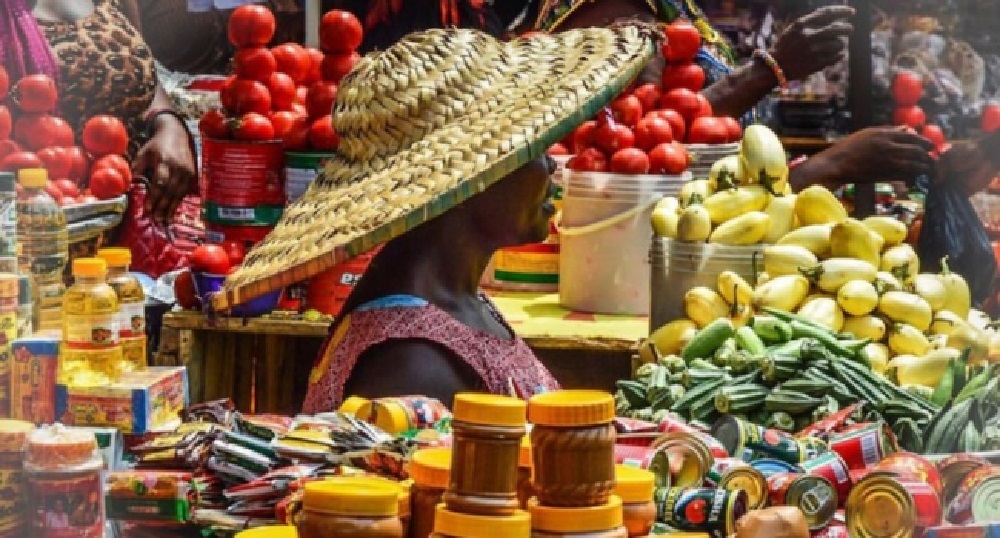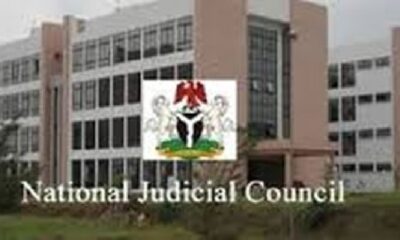Economy
SIM-NIN linkage: Blocked lines rise to 40 million
No fewer than 40 million telephone lines were barred by telecommunication operators over the weekend following the expiration of the February 28, 2024 deadline issued by the Nigerian Communications Commission mandating telecom consumers to link the Subscriber Identity Module to their National Identity Numbers.
This represents a 28 million increase from the 12 million telephone lines initially planned to be deactivated by telcos, following the NCC directive.
In a December 2023 notice, the NCC had asked telcos to bar SIMs that had not been linked to their owners’ NINs by February 28, 2024.
On Thursday, the NCC Director of Public Affairs, Reuben Mouka, ruled out an extension of the deadline, warning that telcos that failed to enforce the deadline would be sanctioned.
The Chairman of the Association of Licensed Telecommunications Operators of Nigeria, Gbenga Adebayo, then disclosed to The PUNCH telcos would bar 12 million lines as a result of the directive.
However, on Sunday, the ALTON chair revealed that the number of barred lines had risen to 40 million, pointing out that SIMs without NIN were included in the number.
In an exclusive interview with The PUNCH, Adebayo said, “I can tell you that over 40 million lines have been blocked and the affected customers are those who didn’t submit their NIN at all. Some persons have not presented any NIN to operators. They haven’t registered their SIMs or participated in the harmonisation programme.
They simply haven’t made any presentation of the NIN number to their operators and those were the persons blocked. So why is the number so alarming despite repeated warnings? It shows many people still communicate but are not registered.”
In the December 2023 notice, the NCC had also asked the Global Satellite Mobile Communications operators to bar SIMs holders whose NINs have been submitted but not verified by March 29, 2024; and interdict those who have less than five lines linked to an unverified NIN by April 15, 2024.
The Federal Government had, on December 16, 2020, introduced the SIM-NIN synchronisation initiative meant to enable security agencies to track criminals.
The synchronisation involves validating the NIN with the National Identity Management Commission and matching the subscriber’s NIN records with the SIM registration information (verification) to ensure proper subscriber identification.
However, Nigerians have raised questions on why security agencies have not used the SIM-NIN linkage to track criminals, especially bandits and kidnappers, who often use mobile telephone lines to speak with victims’ families during ransom negotiations.
Presently, there are 224.7 million active mobile telephone lines in the country, according to the information released by the NCC on its website.
On Sunday, the ALTON chairman did not give the breakdown of subscribers or SIMs that were deactivated by telcos over the weekend.
He said, “No, we currently don’t have the breakdown of disconnected lines per network right now but I know over 40 million lines have been deactivated.”
Adebayo further hinted that another series of disconnections would be implemented by the end of the month and mid April.
Adebayo said, “The second tier of disconnections that will happen are those who have provided NIN but have more than five Mobile Subscription Identification Numbers associated with their NIN, and these have not been verified.
This is because some have differences in the order of their names, and some have differences in their date of birth.
The information provided to the operator when they did the SIM registration is different from what they provided (to NIMC) when they did their NIN. Some subscribers also have some differences in other records that are very critical to their verification process.
“So these people who have more than five MSINs attached to their NIN and haven’t been verified will be disconnected effective March 30, 2024. So we may have more disconnections happening by the end of this month.
If somebody has given a name that has not been verified and has been receiving text messages to verify and they haven’t done that, by March 30th, those people will be disconnected and the figures will further increase.”
He explained, “There are two sources of data-primary and secondary. During the first registration process, the customer’s information is on-boarded to a server when everyone did the SIM registration but the secondary record is for details given during NIN. Hence your primary record has to be uniform with the secondary data across the platforms before you can be verified.
“Furthermore, for those who have less than five MSINs, by April 15th, they will be disconnected if they don’t harmonise their records before then. So we are going to go through a series of disconnections or service suspensions over the next two months if people don’t follow the laid down regulations.”
Reacting, the President, National Association of Telecoms Subscribers, Adeolu Ogunbanjo, has said the body will seek redress in court on Thursday if the deadline is not extended.
Adeolu, who confirmed that the number of barred subscribers was above 12 million earlier indicated, asked the NCC to consider the plight of customers and grant a 31-day extension.
In an interview with The PUNCH on Sunday, he said, “We have appealed to the Nigerian Communication Commission to extend the deadline till March 31st. But if this is not done, we will observe the situation for the next three days, that is Monday to Wednesday and if this is not granted, we will have to file a case in court on Thursday.
“We have and still appealing that this deadline be extended. We understand their position concerning security issues but a 31-day extension would not harm anyone and that is why we didn’t ask for three months. The NCC boss should please give us this gift as a resumption gift and not punish subscribers.”
Economy
Inflation surged to 24.23% due to escalating cost of living

Inflationary pressure has reappeared as Nigerians grapple with increases in average costs of basic food items and energy.
For the first time after the rebasing of the Consumer Price Index (CPI), headline inflation spiked in March to 24.23 per cent – 105 basis points above the 23.18 per cent recorded in the previous month.
The National Bureau of Statistics (NBS) yesterday indicated that the rate of increase in the average price level was higher in March than the level in February.
In January, the NBS updated the weight and price reference periods in calculation of the CPI to make the inflationary gauge more reflective of changes in consumption patterns and the economy generally.
The rebasing did not only brought the base year closer to the current period from 2009 to 2024, it also introduced some critical methodology changes to improve the computation processes.
After the rebasing, inflation dropped from 34.80 per cent in the pre-rebased period of December 2024 to 24.48 per cent in January 2025. It dropped further to 23.18 per cent in February.
In its latest report, NBS recorded 186 basis points changes between the monthly inflation rate, with the month-on-month rate rising from 2.04 per cent in February to 3.90 per cent in March.
The NBS attributed the spike to the rise in costs of food and alcoholic beverages, fuels and electricity, among other items.
Analysts at CardinalStone said the resurgence was due to renewed foreign exchange (forex) pressures amid heightened global risk-off sentiment.
They pointed at foreign portfolio investments (FPIs) outflows and increased dollar demand, which saw naira dropping by 2.4 per cent in March.
Experts also cited increase in price of Premium Motor Spirit (PMS) or petrol, following the temporary suspension of the naira-for-crude swap arrangement.
Food inflation rate stood at 21.79 per cent in March 2025. The composite food index decreased to 21.79 per cent from 23.51 per cent.
Core inflation, which excludes volatile agricultural produce prices and energy, rose to 24.43 per cent from 23.01 per cent.
Specifically, the month-on-month food inflation rose by 50 basis points from 1.67 per cent in February to 2.18 per cent in March.
The NBS attributed the increase in food inflation to increases in the average prices of basic food items including ginger, garri, broken rice, honey, crabs, potatoes, plantain flour, periwinkle and pepper amongst others.
On a state-by-state basis, food inflation was higher in Oyo with 34.41 per cent; Kaduna (31.14 per cent) and Kebbi (30.85 per cent).
On the other side, the 9.61 per cent recorded by Bayelsa; Adamawa (12.41 per cent) and Akwa Ibom (12.60 per cent), were the lowest inflation rates.
Analysts expressed concerns that the resurgent inflationary pressure might lead to renewed tightening stance by the Central Bank of Nigeria (CBN).
CBN Governor Dr. Olayemi Cardoso, had at the end of the first Monetary Policy Committee (MPC) meeting in 2025, reiterated the apex bank’s commitment to orthodox monetary policies, noting that the apex bank’s stance will be reflective of the inflationary trend.
With inflation rate dropping in February, the MPC had decided to maintain all key monetary policy parameters, including the Monetary Policy Rate (MPR) at 27.50 per cent, the asymmetric corridor around the MPR at +500/-100 basis points, the Cash Reserve Ratio (CRR) at 50.00 per cent for Deposit Money Banks and 16.00 per cent for Merchant Banks, and the Liquidity Ratio at 30.00 per cent.
Clarifying the impact of the rebased CPI, Cardoso had explained that the lower inflation figure should not be misinterpreted.
He underlined the need to analyse more data before drawing comparisons, noting that the CBN is currently assessing the figures and will provide further guidance in due course.
The CBN boss stressed the critical importance of collaboration between monetary and fiscal authorities in sustaining recent economic improvements.
Addressing concerns about the impact of elevated borrowing costs on economic growth, the CBN governor assured that the apex bank’s primary objective is to stabilize the foreign exchange and financial markets.
He expressed confidence that such stability would attract increased foreign investments, stimulating the much-needed economic growth.
Cardoso also highlighted the competitiveness of the Nigerian currency, which has spurred growing interest from international investors.
Economy
SEE Current Black Market Dollar (USD) To Naira (NGN) Exchange Rate

The exchange rate between the US dollar and the Nigerian naira continues to draw significant attention from individuals and businesses alike, especially those involved in international trade and remittances.
On Saturday, April 12, 2025, activity in the Lagos parallel market, commonly known as the black market shows that the buying rate for one US dollar stands at ₦1570, while the selling rate is ₦1575.
These figures are sourced from traders and Bureau De Change (BDC) operators who are active in key currency exchange hubs across Lagos.
Why the Black Market Rate Matters
Although the Central Bank of Nigeria (CBN) does not officially recognize or support the use of the black market for foreign exchange transactions, many Nigerians still rely on it due to difficulties in accessing forex through official banking channels. Issues such as limited availability, long processing times, and strict documentation requirements have made the black market a more accessible, albeit riskier, alternative.
CBN’s Official Position
The CBN continues to warn against participating in parallel market trading, stating that such activities undermine the stability of the national currency. The apex bank urges those in need of foreign currency to apply through authorized financial institutions, which are mandated to follow official exchange rates.
Nonetheless, the disparity between the official and unofficial markets persists, often influenced by market forces such as demand, inflation, and fluctuations in Nigeria’s foreign reserves.
Latest Exchange Rates Overview
Black Market (Parallel Market) Rate
Currency Pair Buying Rate Selling Rate
USD/NGN ₦1570 ₦1575
CBN Official Rate
Currency Pair Highest Rate Lowest Rate
USD/NGN ₦1630 ₦1570
Key Notes for Forex Users
The exchange rates in the black market often differ slightly from one location or dealer to another due to market volatility and negotiation margins.
Rates can also fluctuate within hours based on economic news, government policies, and global financial trends.
It is advisable to compare rates from multiple sources before conducting any large transactions, especially in volatile markets.
What This Means for Nigerians
The current forex rates reflect continued pressure on the naira, and many analysts believe that inflation, reduced oil revenue, and inconsistent monetary policies are key factors driving the demand for the dollar. For everyday Nigerians, this means the cost of imported goods remains high, and businesses dependent on international suppliers face growing challenges.
Until forex supply stabilizes through official channels, the black market will likely remain a major player in Nigeria’s currency landscape.
Economy
CHECK Exchange Rate As Naira Weakens More In Parallel Market

Naira has continued its downward slide in the parallel market on Thursday, exchanging at N1,621/$1, a depreciation from N1,580/$1 recorded just a day earlier on Wednesday.
This represents a N41 decline in 24 hours, deepening concerns among traders and economic watchers about sustained volatility in the FX market.
While the official exchange rate stood at N1,644.00/$1 on Wednesday, according to figures published on the Central Bank of Nigeria (CBN) website, there was no updated official rate published by the CBN several hours after the market close on Thursday.
Meanwhile, market participants at Wuse Zone 4 in Abuja attributed the persistent depreciation to a resurgence in speculative activities, unmet demand from importers, and lingering confidence issues in the foreign exchange market.
Alhaji Aminu Gwadabe, President of the Association of Bureau De Change Operators of Nigeria (ABCON), attributed the ongoing volatility in the forex market to a mix of local and global uncertainties. In a message sent to Nairametrics, he stated:
“The volatility, fears, happenings, and shocks in both the local and international markets called for disdain.
President Trump’s tariff announcements have sent markets into panic, loss of confidence, revenue losses, and budget reviews.”
He added that despite ongoing interventions by the CBN, instability persists.
“As usual, the CBN, being a catalytic actor, must continue to ensure stability through timely interventions. However, volatility remains a challenge and needs to be more comprehensively addressed,” Gwadabe said.
He further called for an expanded policy transmission mechanism to better serve the retail end of the FX market.
“It is therefore necessary for the CBN to reevaluate the efficacy of that Policy transmission mechanisms and expand its scope to the BDCs retail segment of the market to cater for the needs of the critical retail needs of invisible transactions where the BDCs pose the most potent tool of the CBN policy transmission mechanism.”
Dr. Muda Yusuf, CEO of the Centre for the Promotion of Private Enterprise (CPPE), also linked the naira’s recent struggles to global developments and speculative pressures.
“This is not unconnected to recent policy signals from President Trump and global oil price movements. The market is heavily information-driven, and speculative pressure has spiked following the tariff announcements,” Yusuf explained.
“Now that Trump appears to be having second thoughts, we might even see a bit of a breather in the FX market,” he added.
Meanwhile, traders on the ground say the situation is being worsened by the uncertainty surrounding ongoing government reforms and inconsistent access to official FX windows.
“The demand today was unusually high, especially from small businesses that can’t access the banks. It’s putting pressure on our supply,” a trader at Abuja’s Wuse Zone 4, who asked not to be named stated.
The spread between the official exchange rate of N1,644/$1 and the parallel market rate of N1,621/$1 narrowed slightly on Thursday, a sign that some convergence may be taking place, despite persistent volatility.
Market analysts warn that unless the CBN resumes consistent interventions or significantly boosts FX liquidity, the naira may continue to face downward pressure in the weeks ahead
The continued slide of the naira, despite heightened CBN interventions, signals persistent challenges in Nigeria’s FX liquidity and structural demand-supply mismatch.
-

 News15 hours ago
News15 hours agoTinubu Remains Engaged In Governance From Europe, Will Return After Easter – Presidency
-

 News15 hours ago
News15 hours agoFirst Lady Convoy Kills Seven-Year-Old Girl In Ondo State
-

 News2 hours ago
News2 hours agoJust in: Many Feared Killed In Abuja
-

 Foreign15 hours ago
Foreign15 hours agoTrump To Close US Embassies In South Sudan, France, Others
-

 News6 hours ago
News6 hours agoEmergency Rule: We should be thankful to President Tinubu -Wike
-

 News6 hours ago
News6 hours agoSenator Natasha on FB listed 3 politicians that should be arrested if anything happens to her
-

 News14 hours ago
News14 hours agoNJC investigates 18 Imo judges over suspected age falsification
-

 News14 hours ago
News14 hours agoNANS threatens protest over alleged student loan diversion






